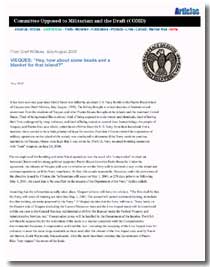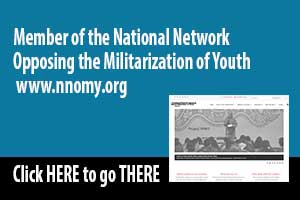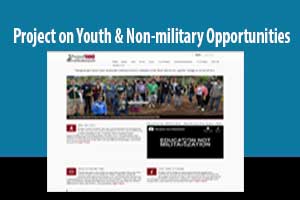From Draft NOtices, July-September 2023
- Davíd Morales
 There is no doubt that teachers are key participants in the struggle against militarism in schools and society. Over the years, counter-recruitment efforts have benefited from teachers who sympathize with our mission to provide young people with an alternative point of view about military enlistment so that they can make an educated decision about their future. Teachers have invited our organization, Project YANO (Youth And Non-Military Opportunities), to their middle and high school classrooms to present students with facts about the realities of military life and war. They have helped mobilize students to speak out against predatory military recruitment practices at school sites and, thus, have played a role in successful campaigns for policies that have removed JROTC shooting ranges from campuses, restricted methods recruiters use to target students, and curbed the involuntary enrollment of students in JROTC.
There is no doubt that teachers are key participants in the struggle against militarism in schools and society. Over the years, counter-recruitment efforts have benefited from teachers who sympathize with our mission to provide young people with an alternative point of view about military enlistment so that they can make an educated decision about their future. Teachers have invited our organization, Project YANO (Youth And Non-Military Opportunities), to their middle and high school classrooms to present students with facts about the realities of military life and war. They have helped mobilize students to speak out against predatory military recruitment practices at school sites and, thus, have played a role in successful campaigns for policies that have removed JROTC shooting ranges from campuses, restricted methods recruiters use to target students, and curbed the involuntary enrollment of students in JROTC.
Teachers have also inspired people like me to become counter-recruitment activists and return to the classroom as educators ourselves. It is from this vantage point, as a former high school teacher and, now, an instructor in the Stanford (University) Teacher Education Program (STEP) that I write this article to share how some of us doing anti-militarism work have begun to direct our attention toward teacher education programs.
While there are teachers who sympathize with our efforts, there are many more who do not know that groups like Project YANO exist, who do not know how to respond to the predatory recruitment of their students, or who simply take militarism in schools for granted -– as something completely normal and acceptable. For those of us who are or have been educators, our experiences are that teacher training programs never talk about militarism in schools. When consequential educational policies reflected in the No Child Left Behind Act(NCLB) or the Every Student Succeeds Act are mentioned, there is never a discussion about how these policies including mandating military access to public schools and student information. In our experience, even teacher education programs that emphasize social justice in their mission statements fail to discuss how schools are disproportionately targeted by the military when they have a predominantly working-class, youth-of-color student population.
As the military-industrial complex continues to grow, and as the military continues to pour millions into devising new ways to recruit in schools and rectify their failure in meeting recruitment goals, our counter-recruitment and anti-militarism movement also needs to find new ways to build a critical consciousness about militarism and the reality of military service. The idea to approach college-level education programs that train teachers who will work directly with students is one way to do this. It is an approach recently embraced by a group of individuals during a national strategy discussion convened by counter-recruitment activists and organizations from across the U.S. One of the first teacher education counter-recruitment presentations that followed this discussion was led by our organization, Project YANO, for STEP. The purpose of this presentation was to introduce teacher candidates to the issue of militarism in schools, to convey that this is a social justice issue in education, and to discuss what their role might be as future teachers – i.e., how they might address militarism in their classrooms and act to prevent predatory recruiting. The idea for the presentation was pitched to one of the directors of the teacher education program and they accepted, agreeing that the topic is rarely talked about and that it was important for their future teachers to familiarize themselves with the subject.
Our presentation was led by three board members of Project YANO: Lauren Morales, a middle school history teacher; Ana Yeli Ruiz, a Marine veteran; and myself. Our 90-minute presentation was given in May 2023 and was held after teacher candidates had concluded their school day. It was a virtual presentation through Zoom that allowed everyone to join from their respective locations, including our presenters. In attendance were approximately 30 soon-to-be teachers, representing different subjects and grade levels. We began the presentation by asking them to react to recent news headlines: “Thousands of Teens Are Being Pushed into Military’s Junior R.O.T.C.,” “With Few Able and Fewer Willing, U.S. Military Can’t Find Recruits,” “Military Acknowledges More Sexual Abuse in J.R.O.T.C. Programs,” “Army Drops Requirement for High School Diploma Amid Recruiting Crisis.” We reviewed the history of militarism in schools and screened the short video, “Before You Enlist,” a tool that counter-recruitment groups regularly use in presentations to high school students. We talked to the teacher candidates about the different ways students are targeted and recruited in schools. Lauren shared her experiences as a teacher and as a reviewer of JROTC textbooks and curriculum, and Ana Yeli shared her experiences as a young woman who was recruited into the military. We ended with resources, ideas, and suggestions for how they might approach the subject of militarism as teachers.
The STEP teacher candidates were highly engaged in our presentation. The examples of militarism that we shared in schools resonated with some of them, who told of similar experiences in their own schooling. One teacher candidate shared that all of their friends who were in JROTC eventually joined the armed forces. Another teacher candidate was interested in learning how militarism looked in California schools compared to her home schools in Hawai’i. One teacher candidate asked for suggestions in mobilizing their future “white, middle-class children who will not be necessarily targeted . . . and who feel like this problem doesn’t really connect to their lives.” Military veteran Ana Yeli aptly responded that many affluent kids eventually go off to work for the military-industrial complex, on the civilian side, for companies like Boeing and Lockheed Martin, and it is therefore important to address militarism with them as well. A high school science teacher candidate asked how she might address the issue of militarism in her science classroom. Our presenter Lauren suggested that she might consider talking about the U.S. military as one of the main polluters of the planet and the ecological impact that warfare has had historically on different regions of the planet.
We consider the presentation to the STEP teacher candidates a success and hope that they will engage their future students in critical discussions about militarism in our society. At the very least, we hope that they will know that they can reach out to organizations like Project YANO if they witness predatory recruitment practices at the school sites. We plan to continue these kinds of presentations and workshops with STEP and other teacher education programs across California, and hope to see counter-recruitment activists in other regions begin to engage in similar work. We also hope to be more present in other teacher spaces, like at teacher conferences and professional development opportunities. Our goal is to foster support among teachers -– current and future -– who we know are key to our struggle for a peaceful and just society, wherein schools are free of militarism and the predatory recruitment of our young people.
This article is from Draft NOtices, the newsletter of the Committee Opposed to Militarism and the Draft (http://www.comdsd.org/).





